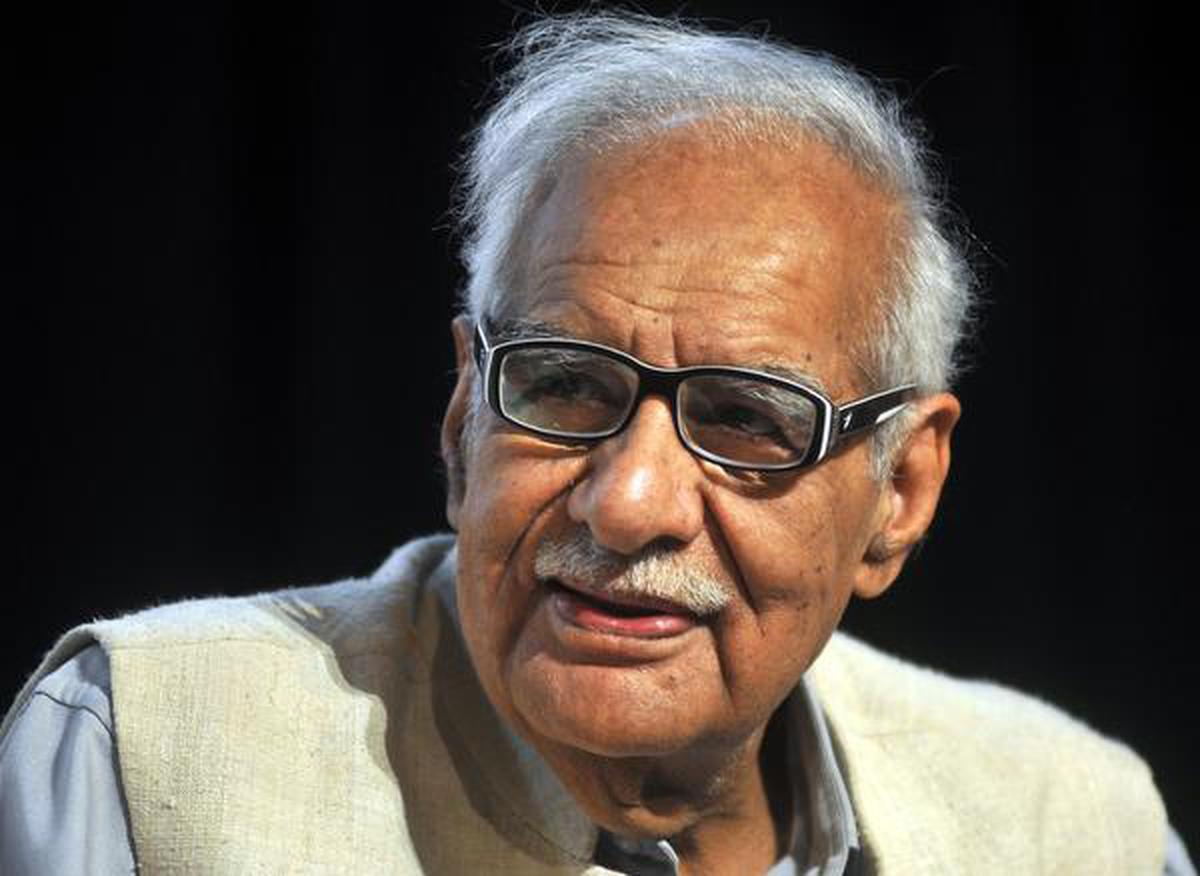News Anchor
Kuldip Nayar Wiki,Early life, Awards,Net Worth,Lifestyle,Relationship and more

Early Life:
Kuldip Nayar, an iconic figure in Indian journalism, was born on August 14, 1923, in Sialkot, Punjab, British India (now in Pakistan). His father, Gurbaksh Singh, was a government servant, and his mother, Shanti Devi, was a homemaker. Nayar’s formative years were spent in Sialkot, where he completed his early education.
Education:
Nayar pursued his higher education at Forman Christian College in Lahore. It was during his college years that he developed a keen interest in writing and journalism. After completing his education, he decided to pursue a career in journalism, driven by a desire to contribute to the public discourse and advocate for social change.
Career Beginnings:
Nayar’s journalistic journey began in the early 1950s when he joined the Press Trust of India (PTI) as a reporter. His relentless pursuit of truth and unwavering commitment to journalistic integrity quickly earned him recognition within the industry.
Rise to Prominence:
Nayar’s career reached new heights when he joined the editorial team of The Statesman, one of India’s leading English-language newspapers. As a senior editor, he played a pivotal role in shaping the newspaper’s editorial direction and influencing public opinion on key issues.
Journalism and Activism:
Throughout his illustrious career, Nayar was known for his fearless pursuit of truth and his unwavering commitment to social justice. He used his platform as a journalist to highlight the plight of the marginalized and advocate for their rights.
Books and Literary Contributions:
In addition to his work as a journalist, Nayar was also a prolific author and commentator. He penned several books on a wide range of topics, including politics, history, and current affairs. His writings were characterized by their clarity, insightfulness, and unflinching critique of the status quo.
Awards and Recognitions:
Nayar’s contributions to journalism and literature were widely recognized and honored. He received numerous awards throughout his career, including the Padma Bhushan, one of India’s highest civilian honors, in recognition of his exceptional service to the nation.
Personal Life:
Nayar was a private individual who valued his personal relationships deeply. He was married to Bharti Nayar, with whom he shared a lifelong partnership filled with love, mutual respect, and shared values. Together, they built a life centered around their family and their shared commitment to social activism
| Attribute | Details |
|---|---|
| Full Name | Kuldip Nayar |
| Nickname | N/A |
| Nationality | Indian |
| Zodiac/Sun Sign | N/A |
| Birthplace | Sialkot, Punjab, British India (now in Pakistan) |
| Current Address | Deceased (Passing: August 23, 2018) |
| Parent’s Name | N/A |
| Siblings | N/A |
| Wife | Bharti Nayar |
| Children | Rajiv Nayar, Rekha Nayar |
| School | Forman Christian College, Lahore |
| Awards | Padma Bhushan (2007), Ramnath Goenka Excellence in Journalism Award (2005) |
| Kuldip Nayar Journalism Award (2001) | |
| Alma Mater | Punjab University, Lahore |
| Highest Qualification | Law Degree |
| Net Worth | N/A |
| Hobbies | Writing, Public Speaking, Political Activism |
| Height | N/A |
| Weight | N/A |
| N/A | |
| N/A | |
| N/A |
Less Known Facts:
- Political Activism: Nayar was actively involved in political activism throughout his life, advocating for peace, justice, and human rights. He was a vocal critic of government policies and was not afraid to speak out against injustice, even at great personal risk.
- Interfaith Dialogue: Nayar was a strong proponent of interfaith dialogue and communal harmony. He believed in the power of dialogue and mutual understanding to bridge divides and promote peace in society.
- International Engagement: Nayar’s influence extended beyond India’s borders, and he was actively engaged in international forums and conferences on issues of global significance, including peacebuilding, disarmament, and human rights.
- Legacy of Mentorship: Throughout his career, Nayar served as a mentor and role model to countless young journalists, inspiring them to uphold the highest standards of integrity and professionalism in their work.
- Commitment to Truth: Nayar’s commitment to truth and journalistic integrity was unwavering, even in the face of adversity. He believed that journalism was a noble profession with the power to hold those in power accountable and give voice to the voiceless.
FAQs:
Certainly, here are some lesser-known facts about Kuldip Nayar:
- Early Career as a Diplomat: Before embarking on his illustrious career in journalism, Kuldip Nayar briefly served as a diplomat. He joined the Indian Foreign Service (IFS) in the 1950s but soon realized that his true passion lay in journalism and decided to pursue it full-time.
- Author of Fiction: While Kuldip Nayar was best known for his work as a journalist and commentator on political affairs, he also dabbled in fiction writing. He authored a novel titled “Beyond the Lines,” which was published in 2012. The novel explores themes of love, loss, and identity against the backdrop of India’s partition.
- Multilingual Skills: Nayar was proficient in multiple languages besides English and his native Punjabi. He was known to be fluent in Hindi, Urdu, and several other Indian languages, which enabled him to communicate effectively with diverse communities and audiences across the country.
- Passionate Advocate for Press Freedom: Throughout his career, Nayar was a passionate advocate for press freedom and the protection of journalists’ rights. He actively campaigned against censorship and government restrictions on the media, believing that a free and independent press was essential for a vibrant democracy.
- Peace Activism: In addition to his journalism and writing, Nayar was deeply involved in peace activism and conflict resolution efforts. He was a vocal proponent of dialogue and reconciliation in regions affected by conflict, including Kashmir and the India-Pakistan border, and worked tirelessly to promote peace and understanding between communities.
- Humanitarian Work: Nayar was actively involved in various humanitarian causes and charitable initiatives throughout his life. He supported organizations working on issues such as education, healthcare, and poverty alleviation, using his influence and resources to make a positive impact on society.
- Documentary Filmmaker: In addition to his written work, Nayar also ventured into the world of documentary filmmaking. He produced and directed several documentaries on topics ranging from social justice to cultural heritage, using the medium of film to raise awareness and provoke thought on pressing issues.
- Awards and Recognitions: While Nayar received numerous awards and honors for his contributions to journalism and literature, including the Padma Bhushan, he remained humble about his achievements. He saw his work as a journalist and activist not as a means for personal accolades but as a way to serve the public good and uphold democratic values.
- Political Commentary: Nayar was known for his incisive political commentary and insightful analysis of current affairs. His columns and editorials were widely read and respected for their depth of insight and impartiality, earning him a reputation as one of India’s most influential voices in the field of journalism.
- Commitment to Mentorship: Throughout his career, Nayar was dedicated to mentoring young journalists and writers, sharing his knowledge and experience with the next generation. He believed in the importance of nurturing talent and fostering a culture of excellence in the field of journalism, inspiring countless aspiring journalists to follow in his footsteps.
Controversies:
Certainly, here are some actual controversies involving Kuldip Nayar:
- Emergency Period: During the Emergency period imposed by then Prime Minister Indira Gandhi from 1975 to 1977, Kuldip Nayar was among the journalists and activists who openly criticized the government’s actions. He was arrested and detained under the Maintenance of Internal Security Act (MISA) for his vocal opposition to the suspension of civil liberties and censorship of the press.
- Bofors Scandal: In the late 1980s, Kuldip Nayar was involved in investigative reporting on the Bofors scandal, which implicated several high-ranking Indian politicians and officials in alleged kickbacks related to arms deals between India and Sweden. His coverage of the scandal and his criticism of government corruption sparked controversy and backlash from political circles.
- Kashmir Conflict: Kuldip Nayar’s views on the Kashmir conflict, particularly his advocacy for dialogue and peace between India and Pakistan, were often met with criticism from nationalist groups and hardline political factions. Some accused him of being sympathetic to separatist movements in Kashmir and of undermining India’s sovereignty and national interests.
- Religious Communalism: Nayar’s outspoken stance against religious communalism and his calls for interfaith dialogue and harmony sometimes drew criticism from conservative religious groups and communal organizations. He was accused of being anti-Hindu or anti-national by some individuals and groups who disagreed with his views on secularism and religious tolerance.
- Personal Feuds: Over the course of his career, Kuldip Nayar had public disagreements and feuds with certain politicians, journalists, and public figures. These conflicts occasionally spilled over into the media and became topics of public debate and controversy, with accusations and counter-accusations being exchanged in the press.
- Criticism of Government Policies: Nayar was known for his criticism of various government policies and actions, ranging from economic reforms to foreign policy decisions. His vocal opposition to certain government initiatives sometimes led to heated debates and controversies, particularly within political circles and among government officials.
- Allegations of Biased Reporting: On occasion, Kuldip Nayar faced allegations of biased reporting or favoritism in his journalistic work. Critics accused him of allowing his personal opinions and political leanings to influence his reporting, leading to questions about his objectivity and credibility as a journalist.
- Legal Battles: Nayar was involved in several legal battles throughout his career, both as a journalist and as an activist. These legal disputes often revolved around issues of freedom of speech, press freedom, and the right to dissent, with Nayar frequently challenging government actions and restrictions in court.
- International Relations: Nayar’s views on international relations, particularly his advocacy for peace and diplomacy in India’s dealings with neighboring countries like Pakistan and China, sometimes sparked controversy and debate. Critics accused him of being overly idealistic or naive in his approach to foreign policy issues.
- Legacy and Interpretation: Following his passing in 2018, there have been debates and discussions about Kuldip Nayar’s legacy and how his life and work should be interpreted and remembered. While many have praised his contributions to journalism, literature, and social activism, others have raised questions about certain aspects of his career and ideology, leading to ongoing debates and controversies surrounding his legacy.
Kuldip Nayar’s life and work continue to serve as a beacon of inspiration for journalists, writers, and activists around the world. His unwavering commitment to truth, justice, and social change remains a powerful reminder of the important role that journalism plays in shaping our society and holding those in power accountable.
